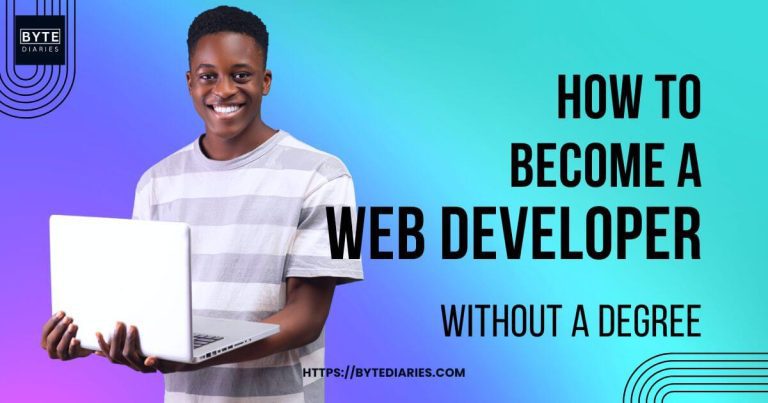Becoming a web developer without a degree may sound challenging, but it’s absolutely possible and many successful developers have done it!
If you’re eager to become a web developer but don’t have a formal computer science degree, don’t worry. This guide will show you the step-by-step process of how to break into the world of web development without a degree.
Table of Content
Why is Web Development a Great Career Choice Without a Degree?
The tech industry values skills, experience, and the ability to problem-solve more than formal education. Companies like Google, Apple, and even startups are hiring developers based on their skills and portfolio rather than a degree. So, if you’re ready to put in the effort, the opportunities are endless!
1. Understand the Basics of Web Development
The first step in becoming a web developer without a degree is to learn the basics. Web development is divided into front-end and back-end development.
- Front-end development focuses on everything the user interacts with on the website.
- Back-end development deals with the server side, databases, and server logic.
2. Learn Key Web Development Technologies
Now that you understand the basics, it’s time to dive into the technologies you’ll need to know. Some of the most important technologies for a web developer include:
- HTML: The structure of web pages.
- CSS: The design and layout of web pages.
- JavaScript: Adds interactivity to web pages.
- React/Angular/Vue.js: Frameworks/libraries to build modern web applications.
- Node.js: JavaScript on the server side. You can also choose other languages & frameworks such as PHP, Python, Java etc.
- Git/GitHub: Version control and collaboration tools.
These are just some of the technologies you’ll need to master. You don’t need a degree to learn them—there are plenty of online resources and courses to get started.
3. Build Your Portfolio
As a web developer without a degree, having a strong portfolio is your most important asset. A portfolio allows potential employers or clients to see your skills and what you’re capable of.
Start by working on personal projects like:
- A personal website or blog (you can use your skills to create your own site!)
- A to-do list, weather app, or any challenge from the front-end mentor to showcase your JavaScript and front-end skills.
- A portfolio website to showcase your projects.
Make sure your portfolio is neat, well-organized, and easy to navigate.
4. Gain Practical Experience
While formal education might not be required, practical experience is still crucial. You can gain experience by:
- Contributing to open-source projects: This will help you work with others and improve your skills.
- Freelancing: Websites like Fiverr, Upwork, and Freelancer are great platforms to find web development jobs. View our guide on how to get started with freelancing for web developers
- Internships: Some companies offer internships to non-degree holders looking to gain hands-on experience.
The key is to start building projects and work on real-world applications to improve your skills.
5. Learn from Others and Join the Community
The web development community is one of the most supportive and collaborative groups you’ll find. To further your learning, consider:
- Joining developer forums like Stack Overflow or Reddit’s web development community.
- Participating in coding challenges on websites like Codewars or LeetCode.
- Attending local meetups or tech conferences to network and learn from others in the field.
6. Keep Learning and Stay Updated
Web development is constantly evolving, so it’s important to keep learning. Follow industry blogs, subscribe to YouTube channels, and take advanced courses to stay on top of the latest trends and technologies.
Some great resources include:
- freeCodeCamp: Offers free coding lessons.
- MDN Web Docs: A reliable resource for web development documentation.
- Udemy: Offers paid courses in web development.
FAQs
1. Can I become a web developer without a degree?
Yes! Many successful web developers didn’t go to college for computer science. You can learn the skills online and build a strong portfolio to showcase your abilities.
2. Do I need to know coding languages to start web development?
Yes, learning coding languages like HTML, CSS, and JavaScript is essential for web development. Start with these basics before moving on to more advanced languages and frameworks.
3. How long does it take to become a web developer?
The timeline varies, but with consistent learning and practice, you can become job-ready within 6-12 months.
4. What’s the best way to get my first web development job?
Start by building a strong portfolio, contribute to open-source projects, and apply for internships or freelancing gigs to gain experience.
If you are trying to step into the freelancing world, read our guide on how to find clients as a freelance web developer
Conclusion
Becoming a web developer without a degree is not only possible but also achievable. By following this step-by-step guide, you’ll be well on your way to building a successful career in web development. Remember, the most important factors are commitment and consistency—so keep learning, building, and improving.
Good luck, and happy coding!


